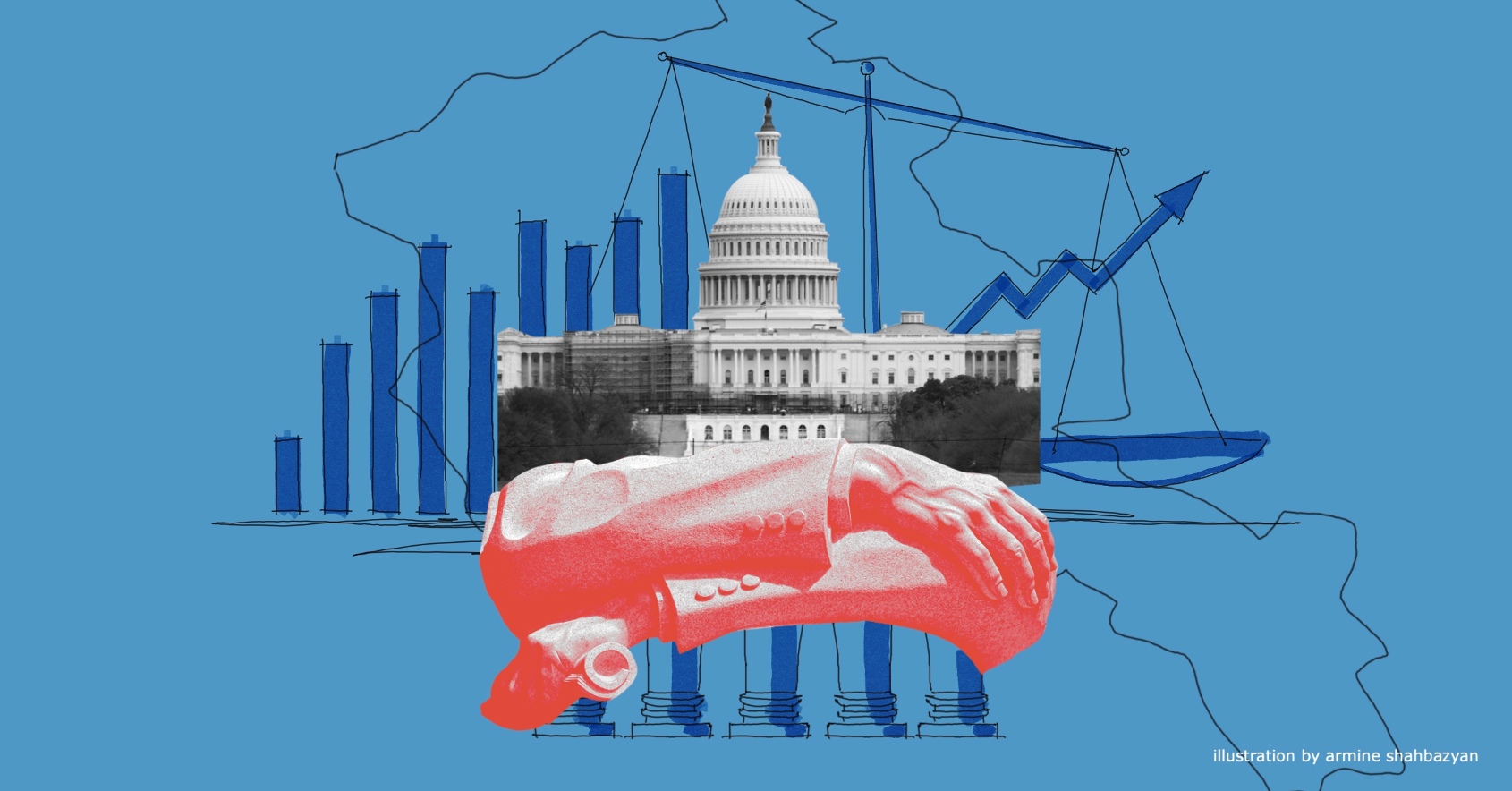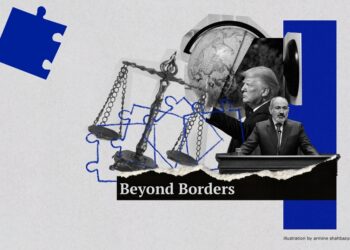
Listen to the article.
On January 14, Foreign Minister Ararat Mirzoyan and Secretary of State Antony Blinken signed the U.S.-Armenia Strategic Partnership Commission charter. The State Department described the agreement as the “latest milestone in the growing U.S.-Armenia relationship,” establishing new avenues for bilateral cooperation, including on economic cooperation, security and defense, democracy, justice, inclusion, and increasing people-to-people exchanges.
In his remarks at the signing ceremony in Washington, Blinken said the framework agreement “lays the foundation for even deeper cooperation,” adding that the U.S. and Armenia are “increasingly strong partners.”
He highlighted peaceful nuclear cooperation as a key area, noting that Yerevan and Washington are preparing to negotiate a 123 Agreement to enable technical exchanges in nuclear power production. Armenia is considering U.S.-made small modular reactors to replace the Metsamor Nuclear Power Plant, which supplies nearly a third of the country’s electricity.
On security and defense, Blinken affirmed U.S. support for Armenia’s “efforts to assert its independence and sovereignty over its own territory” and announced that “next month, in the coming weeks,” a Customs and Border Patrol team will travel to Armenia to work with their Armenian counterparts on border security capacity building. This follows Yerevan’s moves toward reducing Russian presence on Armenia’s borders by removing Russian border guards from Yerevan’s Zvartnots international airport, along the border with Azerbaijan, and the sole checkpoint on the border with Iran. Armenian border guards will also begin joint patrols with their Russian counterparts along the borders with Turkey and Iran, signaling a potential transition toward full Armenian control.
Blinken commended the Armenian government’s reforms in justice and law enforcement, specifically mentioning the Anti-Corruption Champion Awards presented in December to Armenia’s Justice Minister Srbuhi Galyan, the former Deputy Prosecutor General who “co-drafted an asset forfeiture law that has allowed the government to recapture millions of dollars in public funds that were stolen by corrupt officials and oligarchs.”
Mirzoyan said bilateral ties have witnessed “remarkable growth in recent years” and have “matured to a point where upgrading them to a Strategic Partnership is not only fitting but essential for navigating the complex geopolitical landscape.”
The charter, published by Armenia’s Foreign Ministry, underscores the importance of “a strong, independent, sovereign, and democratic Armenia, capable of defending its sovereignty, territorial integrity, and inviolability of internationally recognized borders is essential for lasting regional security and prosperity.” It further notes the United States’ “strong political support and promotion” of Armenia’s “Crossroads of Peace” project.
Taron Chakhoyan, Prime Minister Pashinyan’s deputy chief of staff, called the agreement a “historic document”, adding that strategic cooperation with the U.S. is a “vital factor and catalyst for strengthening Armenia’s sovereignty and fortifying its statehood.”
Pashinyan’s statement was more reserved. In a social media post, he acknowledged the initiation of the U.S. partnership while emphasizing the balanced foreign policy approach Armenia maintains with its neighbors and key global powers. He said the approach “lays a solid foundation for advancing Armenia’s agenda of independence, sovereignty, and statehood, to be further realized in the next phases of its balanced foreign policy.”
Russian Foreign Minister Sergey Lavrov said it is “a sovereign decision of two states,” but emphasized that the key issue lies not in how the document is titled, but in the implications it entails. “We have also used the term ‘strategic partnership’ in a number of treaties with Western countries, but these agreements, while proclaiming strategic partnership, never required any participant to act against a third country,” he said.
The U.S. has previously signed charters on strategic partnership with Georgia in 2009 and Ukraine in 2021. The partnership with Georgia was suspended in November 2024 in response to the Georgian government’s decision to suspend the country’s EU accession process. In recent years, the U.S. has elevated its ties with the Association of Southeast Asian Nations (ASEAN), India, Vietnam, and Indonesia to “comprehensive strategic partnerships.”
The Armenia-U.S. strategic dialogue was established nearly six years ago, with the inaugural meeting being held in Yerevan in May 2019, “one year after the peaceful events of April/May 2018, which led to the election of a new Armenian government committed to democratic and economic reform.” The second meeting was held in May 2022 in Washington and the third in Yerevan in June 2024, when the sides agreed to upgrade the status of bilateral dialogue to strategic partnership.
Amidst the ongoing rift in Armenia-Russia relations, Yerevan has grown increasingly closer to Washington. The trilateral April 5, 2024 meeting in Brussels of Prime Minister Pashinyan, European Commission President Ursula von der Leyen, and Secretary Blinken “reaffirm[ed] support for Armenia’s sovereignty, democracy, territorial integrity, and socio-economic resilience.” In a Helsinki Commission hearing in September, Chairman Rep. Joe Wilson spoke of “clear bipartisan support” to increasing economic and political assistance for Armenia to help “provide a bulwark against external threats.” Armenia’s Defense Minister Suren Papikyan visited Washington in December for a meeting with Defense Secretary Lloyd Austin, who called the visit “historic” and was quoted as saying: “It is our first meeting, and we have a full agenda.”
Some have questioned the relevance of this agreement, given the upcoming inauguration of President-elect Donald Trump. Arman Babajanyan, leader of the pro-Western For the Republic Party, who was the first to reveal the signing of the document a week prior, told Armenia’s Public TV that it has been “fully coordinated” with the Trump team, which has “committed to continuing” the partnership. He pointed to the upcoming visit of a U.S. Customs and Border Patrol team, announced by Blinken, which will occur after Trump takes office. “It is impossible to proceed with something concerning security and a specific commission coming to Armenia to conduct border security work with Armenian partners without coordinating it with the incoming administration,” he noted.
Also see
What Does a Second Trump Presidency Mean for Armenia?
Donald Trump's return to the U.S. presidency may not bode well for Armenia. Yet, it is a reality beyond its control, demanding clear-eyed pragmatism to preserve and build upon the hard-won partnership cultivated in recent years.
Read moreArmenia, U.S. Hold Military Exercise as Defense Ties Expand
Armenia and the U.S. conduct the second joint Eagle Partner military exercise, marking growing defense cooperation between the two countries. Hovhannes Nazaretyan details the exercise's objectives, scale and international reactions.
Read moreEU and the U.S. Pledge to Support Armenia’s Resilience
A high-level meeting designed to support Armenia’s economic resilience took place in Brussels on April 5 and was met with criticism by Azerbaijan and Russia. Hovhannes Nazaretyan explains.
Read more




